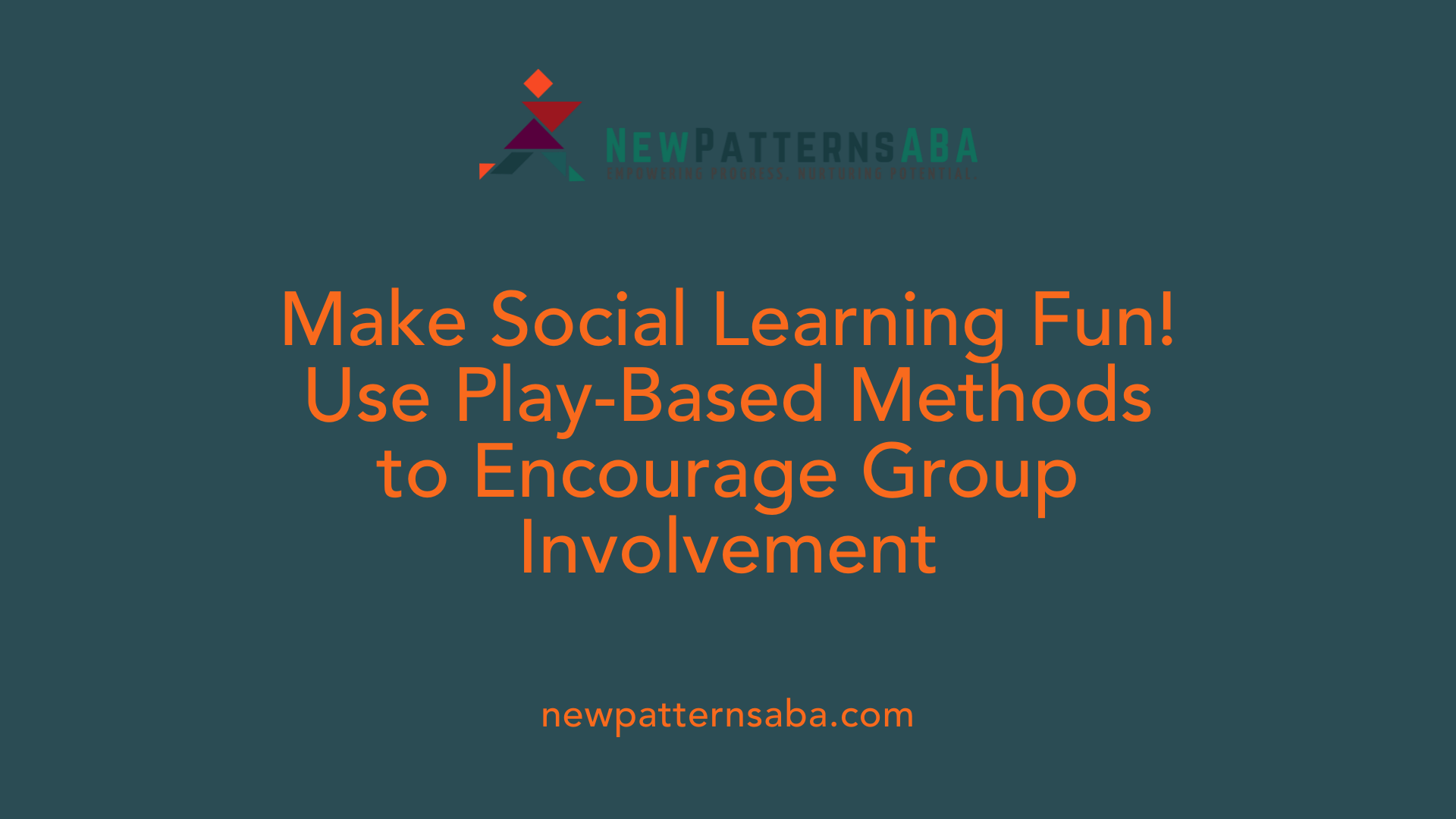Unlocking the Power of Play and Structured Activities in ABA Therapy
ABA therapy plays a vital role in helping children with autism develop essential social skills and actively participate in group activities. By integrating engaging, play-based strategies with structured interventions, ABA aims to create supportive environments where children can learn, practice, and generalize social behaviors, fostering meaningful connections with peers and adults alike.
Effective Techniques Used in ABA to Promote Social Engagement

What techniques does ABA therapy use to enhance social engagement and group participation?
ABA therapy employs a variety of strategies to foster social interaction and improve social skills among children. One fundamental approach is modeling appropriate behaviors, where therapists demonstrate desired social actions for children to imitate.
Prompting and reinforcement are also vital. Prompting involves giving hints or cues to guide children toward correct responses, while reinforcement rewards desirable behaviors, increasing the likelihood of their recurrence.
Structured teaching methods such as social stories and role-playing are extensively used. Social stories describe specific social situations, helping children understand expectations and appropriate responses. Role-playing activities allow children to practice real-life social scenarios in a supportive setting, boosting confidence and skills.
Assessment plays a crucial role in ABA intervention. By evaluating each child's unique needs, therapists set personalized goals that are measurable and achievable. These goals guide targeted interventions like social skills groups or natural environment teaching, which promote practical social participation.
Overall, these techniques create engaging learning experiences, encouraging children to develop meaningful social connections and participate actively in group settings.
How Play-Based Approaches Foster Group Participation in ABA Therapy

How do play-based approaches in ABA therapy facilitate group participation?
Play-based methods in ABA therapy create lively, engaging environments that naturally encourage children to join in social activities. These approaches focus on using fun, meaningful activities such as turn-taking games, pretend play, and group tasks that promote interaction.
In these settings, children practice essential social skills like sharing, communicating, and understanding social cues through guided play sessions. For example, children may participate in role-playing scenarios that mimic real-life social situations, helping them learn to initiate conversations, respond appropriately, and develop empathy.
Structured activities like cooperative games and teamwork exercises are designed to promote collaboration. These activities require children to work together, take turns, and support each other, fostering a sense of social connection and group involvement.
Positive reinforcement, such as praise or rewards, motivates children to participate actively and persist in social interactions. This positive feedback helps reinforce appropriate behaviors and boosts confidence.
Role-playing and pretend play allow children to rehearse social scenarios in a safe environment, making it easier for them to transfer these skills to everyday situations. These activities are especially effective because they combine learning with fun, keeping children motivated.
By making social skill development enjoyable and directly relevant to their experiences, play-based ABA interventions help children build confidence in group settings. Overall, these approaches make social participation more natural and accessible, supporting children in developing meaningful connections with their peers.
Supporting Social Skills Development in Group Settings with ABA

How does ABA therapy support social skills development in group settings?
ABA therapy plays a vital role in helping children improve social skills through structured and tailored programs. These programs include activities such as role-playing, social stories, and visual supports, which serve as tools to model appropriate social behaviors.
In a group context, ABA emphasizes positive reinforcement by rewarding children when they demonstrate skills like eye contact, turn-taking, and effective communication. This encouragement motivates children to practice and strengthen their social interactions.
Group-based ABA interventions foster peer interaction, teamwork, and conflict resolution. These activities create opportunities for children to learn how to navigate social situations, share, and collaborate effectively.
Involving caregivers and teachers is also crucial. Their participation helps reinforce skills learned during therapy across different environments, facilitating the generalization of social behaviors beyond sessions.
Moreover, ABA breaks down complex social skills into smaller, manageable steps. This systematic teaching approach allows children to build confidence incrementally, leading to improved social competence over time.
Overall, ABA supports social development by combining individualized strategies with engaging group activities, ensuring children develop the skills necessary for successful social interactions in various settings.
Benefits of ABA in Enhancing Children's Social Engagement
 ABA therapy plays a vital role in helping children develop social skills necessary for engaging with others effectively. Through tailored methods like social skills training, role-playing, and positive reinforcement, children learn to interpret social cues, communicate their needs, and build meaningful relationships.
ABA therapy plays a vital role in helping children develop social skills necessary for engaging with others effectively. Through tailored methods like social skills training, role-playing, and positive reinforcement, children learn to interpret social cues, communicate their needs, and build meaningful relationships.
Group activities such as team-building exercises, circle time, and cooperative games are integrated into therapy sessions. These activities provide children with real-world practice in social interactions, sharing, taking turns, and collaborating. This supportive environment encourages children to apply their skills naturally, fostering confidence in group settings.
An important aspect of ABA is boosting social motivation. By making activities engaging and enjoyable—such as pretend play, puzzles, and interactive games—children become more motivated to initiate interactions and participate actively. These strategies help children develop long-term social ties and friendships.
Peer group involvement is emphasized to offer authentic social experiences. Whether through structured sports, musical activities, or community tasks, children gain opportunities to mimic real-life social situations, which supports sustained social growth. Continual monitoring and communication with therapists ensure that interventions are effective and tailored to individual needs.
Overall, ABA therapy not only enhances immediate social participation but also promotes enduring social competence and affectionate bonds, laying a foundation for lifelong social success.
Creating Environments That Support Social Skill Development

How does creating supportive environments enhance social skill development?
Designing spaces at home and within the community is crucial for nurturing social skills in children undergoing ABA therapy. Specific areas such as quiet corners for self-calming help children manage their emotions, creating a sense of safety. Designated spots for learning and therapy activities provide structure, which is essential for engagement and focus.
These environments help children practice social norms in a consistent and predictable setting, making it easier to transfer skills learned during therapy to everyday situations. When children are provided with stable spaces, they are more likely to participate actively in social interactions, showing increased confidence.
Supporting environments also involve steady reinforcement of goals. Using consistent prompts, rewards, and routines across different settings encourages children to apply what they learn in diverse contexts. This consistency is vital for children to generalize social skills outside of therapy sessions.
Moreover, regular monitoring and ongoing communication with ABA therapists, through logs and reviews, allow for tailored adjustments to the child's program. This collaborative approach ensures strategies remain relevant and effective.
By creating such supportive, structured environments, parents, teachers, and caregivers help children build social engagement and independence, ultimately promoting successful social participation and emotional growth.
Making Learning Fun and Engaging to Promote Social Skills
Using natural environment training (NET) in ABA therapy
Natural environment training (NET) is a play-based approach that makes learning enjoyable by integrating social skills within the child's everyday environment. In this method, children participate in activities they naturally find engaging, such as playing with toys, engaging in pretend play, or exploring their surroundings. This approach encourages children to practice real-world skills, like requesting items or initiating social interactions, in settings that are familiar and meaningful to them.
Aligning activities with children’s interests
Engagement is crucial in ABA therapy, especially when aiming to develop social skills. One effective way to boost motivation is by choosing activities that align with the child's hobbies and preferences. For example, a child who loves music may benefit from musical games or singing activities that promote collaboration. When children are interested in the activity, they are more likely to participate actively and develop positive associations with learning.
Varying activities to prevent boredom
To keep children engaged, therapists often vary tasks and activities. Mixing structured exercises like role-playing with free play or cooperative games helps prevent boredom and maintains attention. Rotating activities such as puzzles, obstacle courses, or group sports provides diverse opportunities for practicing different social and cognitive skills, ensuring that children remain excited and eager to learn.
Incorporating rewards and clear instructions
Using rewards and clear guidance encourages participation and reinforces desired behaviors. Providing positive reinforcement, like praise or tokens, motivates children to practice skills like sharing, taking turns, or problem-solving. Additionally, clear instructions help children understand what is expected, reducing frustration and increasing successful engagement in activities.
| Strategies for Engagement | Examples | Benefits |
|---|---|---|
| Play-based learning | Puzzles, role-playing, pretend play | Builds real-world skills while keeping children motivated |
| Interest-driven activities | Music, sports, favorite themes | Increases participation and joy in learning |
| Activity variation | Switching between games, tasks | Prevents boredom and promotes diverse skills |
| Rewards and instructions | Praise, tokens, clear steps | Reinforces good behaviors and clarifies expectations |
Aligning activities with interests, varying tasks, and using rewards help create a fun, supportive environment. This not only makes social skill-building more effective but also promotes a long-lasting love of learning and interaction.
Empowering Children for Meaningful Social Connections
ABA therapy combines evidence-based techniques, playful activities, and supportive environments to foster social engagement among children with autism. By systematically teaching and reinforcing social skills in fun, meaningful ways, ABA empowers children to participate confidently in group activities, build friendships, and navigate social worlds with greater ease. Ongoing collaboration between therapists, caregivers, and educators is essential to sustain these gains and promote long-term social success.
References
- What to Expect in ABA Therapy: Activities That Help Kids Thrive
- Using Play as a Teaching Tool in ABA Therapy
- A Guide to Creating Engaging ABA Activities for Children
- How does ABA Therapy Incorporate Fun and Positive ...
- How to Teach Social Skills Using ABA Principles
- Social Skills Training in Applied Behavior Analysis? ASD
- Applied Behavior Analysis (ABA) | Autism Speaks
- Harnessing ABA Therapy for Social Skills Development in Autism





